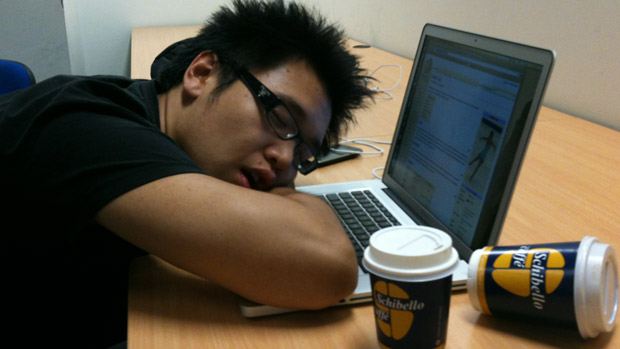How sleep training can rid your brain of sexism and racism
Study appears to show that sleeping 'provides a unique window for altering fundamental beliefs'

A free daily email with the biggest news stories of the day – and the best features from TheWeek.com
You are now subscribed
Your newsletter sign-up was successful
Innermost prejudices about race and gender can be eliminated using "sleep training", according to scientists in Illinois.
A study carried out at Northwestern University found that biases can be altered during sleep. It did not target overt sexism or racism, but rather implicit biases arising from long-term socialisation and frequently reinforced by mass media. For example, previous research has shown that 80 per cent of people have a bias against the elderly and that people often have a preference for white faces over black faces.
"These biases are well-learned," said Xiaoqing Hu, who led the study. "They can operate efficiently even when we have the good intention to avoid such biases. Moreover, we are often not aware of their influences on our behaviour."
The Week
Escape your echo chamber. Get the facts behind the news, plus analysis from multiple perspectives.

Sign up for The Week's Free Newsletters
From our morning news briefing to a weekly Good News Newsletter, get the best of The Week delivered directly to your inbox.
From our morning news briefing to a weekly Good News Newsletter, get the best of The Week delivered directly to your inbox.
In the Illinois study, participants took part in two Pavlovian-style conditioning exercises while they were awake, one showing female faces with words linked to maths or science and another showing black faces with pleasant words such as "cheer", "smile" and "honour".
Two distinctive sounds were played during the tasks. Then the sounds were played again while the participants took a 90-minute nap.
According to the researchers, the auditory cues partially undid racial and gender bias, with the effects still evident a week later. Before the nap, bias scores fell slightly but for those who listened to the sound cues during sleep the scores fell a further 56 per cent.
Hearing the sound replayed repeatedly during sleep helps to consolidate memories, transferring them from short-term storage to long-term storage in the brain, said the scientists.
A free daily email with the biggest news stories of the day – and the best features from TheWeek.com
Comparing the study to "sleep teaching" in Aldous Huxley’s Brave New World, The Guardian says the findings "appear to confirm the idea that sleeping provides a unique window for accessing and altering fundamental beliefs".
A similar strategy could be used to reduce other kinds of biases or to tackle bad habits such as smoking and over-eating, said the study's authors.
In an accompanying commentary published in Science, two psychologists said the findings highlight "the breadth of possible applications to permanently modify any unwanted behaviour by targeted memory reactivation during sleep".
-
 Political cartoons for February 16
Political cartoons for February 16Cartoons Monday’s political cartoons include President's Day, a valentine from the Epstein files, and more
-
 Regent Hong Kong: a tranquil haven with a prime waterfront spot
Regent Hong Kong: a tranquil haven with a prime waterfront spotThe Week Recommends The trendy hotel recently underwent an extensive two-year revamp
-
 The problem with diagnosing profound autism
The problem with diagnosing profound autismThe Explainer Experts are reconsidering the idea of autism as a spectrum, which could impact diagnoses and policy making for the condition
-
 ‘It’s too early to conclude that Boris has used up the last of his nine lives’
‘It’s too early to conclude that Boris has used up the last of his nine lives’Instant Opinion Your digest of analysis from the British and international press
-
 ‘Other wannabe Putins await to sow death and destruction’
‘Other wannabe Putins await to sow death and destruction’Instant Opinion Your digest of analysis from the British and international press
-
 Home Office worker accused of spiking mistress’s drink with abortion drug
Home Office worker accused of spiking mistress’s drink with abortion drugSpeed Read Darren Burke had failed to convince his girlfriend to terminate pregnancy
-
 The Week Unwrapped: Sri Lanka, second homes and Siri
The Week Unwrapped: Sri Lanka, second homes and Siripodcast Is Sri Lanka’s latest crisis a warning for the rest of the world? Are second-home owners facing a revolt in Cornwall? And why do most digital assistants have women’s voices?
-
 In hock to Moscow: exploring Germany’s woeful energy policy
In hock to Moscow: exploring Germany’s woeful energy policySpeed Read Don’t expect Berlin to wean itself off Russian gas any time soon
-
 Were Covid restrictions dropped too soon?
Were Covid restrictions dropped too soon?Speed Read ‘Living with Covid’ is already proving problematic – just look at the travel chaos this week
-
 Inclusive Britain: a new strategy for tackling racism in the UK
Inclusive Britain: a new strategy for tackling racism in the UKSpeed Read Government has revealed action plan setting out 74 steps that ministers will take
-
 Sandy Hook families vs. Remington: a small victory over the gunmakers
Sandy Hook families vs. Remington: a small victory over the gunmakersSpeed Read Last week the families settled a lawsuit for $73m against the manufacturer